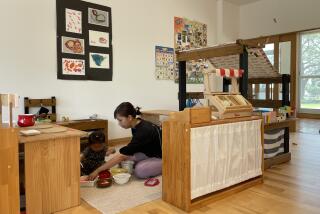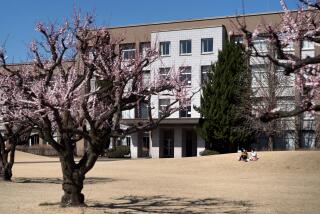New Japanese-U.S. college wakes sleepy town : An experiment in education is helping some West Virginians feel the world is a lot smaller.
SALEM, W.Va. — As a country kid growing up on a cattle farm in West Virginia, Dale Jones’ chances of finding the Japanese girlfriend he always dreamed of were mighty slim.
But in 1989, the world Jones lived on suddenly got a whole lot smaller.
Salem College--the little, perennially poor, 101-year-old liberal arts school in north-central West Virginia where he was a communications major--was bought by wealthy Teikyo University of Japan.
Now, Salem College had been rescued from imminent closure. Its name has been changed to Salem-Teikyo University and its Japanese owners have set up a $7.5-million endowment and given it an educational mission for the 21st Century.
And Dale Jones, 20, of rural Tucker County, is going steady with a teen-ager named Akiko from Urawa, Japan.
Akiko Kobayashi, 19, was one of 183 Japanese teen-agers who arrived in the sleepy, no-stoplight town of Salem in April of 1990 to begin their American educations.
Located about 130 miles south of Pittsburgh, Pa., Salem has about 2,500 residents, a couple of banks, a cafe, too many unemployed people and 12 miles of lonely Route 50 between it andClarksburg’s 25,000 people to the east.
The Japanese students, fresh from high schools in cosmopolitan cities such as Tokyo and Osaka, were the first wave of pioneers in an ambitious trans-Pacific experiment in higher education that is being conducted at Salem-Teikyo.
The experiment is part of growing movement to internationalize higher education in Japan. In the last two years, the Teikyo University Group, which also has campuses in Japan and Europe, has bought financially struggling colleges in Connecticut, Denver, Iowa and San Diego, where it purchased United States International University.
Teikyo President Shiochi Okinaga’s grand design is to create a new breed of Japanese college student, a bilingual, Americanized “world citizen” with an open-minded, international point of view.
By all accounts, the first year at STU has gone pretty well. There have been no ugly incidents like the one in Denver at Teikyo-Loretto Heights University, a Teikyo University-bought school where last fall six Japanese men were robbed and beaten with baseball bats by young Americans in a park.
At STU, there have been no serious academic or social problems with the first group of Japanese students, said Kitty Main, the school’s international student adviser.
The Japanese, who attend classes year round, pay close to $15,000 per year for their room, board and tuition while the American students pay about $10,000 for two semesters.
In April, a new batch of 117 Japanese freshmen arrived. That put the STU student body at 282 Japanese (17 of the original group returned to Japan or transferred to other U.S. schools) and 350 Americans.
By 1993, STU plans to have 500 Japanese and 500 Americans together at a typical American liberal arts college.
West Virginia’s friendly people and its low crime rate were the main reasons President Okinaga chose the state. Early fears of local prejudice toward the Japanese never materialized--just as Salem Mayor Donna Stewart had always confidently predicted.
Her major civic problem last summer was getting the Japanese to ride their bikes with traffic. This summer her biggest problem centers around the 40 or 50 Japanese young men who have bought new or used sporty cars.
They are having trouble, like teens everywhere, abiding by local traffic laws. “They’re keeping the roads hot between here and Clarksburg,” the mayor observed.
From now on, however, it won’t be so easy for Japanese students to learn to drive. The school has enacted a new policy that requires incoming Japanese freshmen to pass a difficult test of English fluency or complete their first year of English courses before being allowed to take a driver’s test.
The new group of Japanese--101 men and 16 women--is different from the first wave, Dale Jones has noticed.
“The kids last year got culture shock. Most of them were from Tokyo. This is a more diverse group and they are better prepared, English-wise. They understand a little better than the others did,” he said.
Jones and Akiko Kobayashi have been dating for a year, and she has stayed at his parents’ farm for about three weeks.
“My parents like her,” Jones said. “She was kinda shy at first, but she helped around the house like Mom does. She cooked for us sometimes. Mother thinks it’s fine.”
He plans to visit her home in Japan at Christmas.
More to Read
Sign up for Essential California
The most important California stories and recommendations in your inbox every morning.
You may occasionally receive promotional content from the Los Angeles Times.










